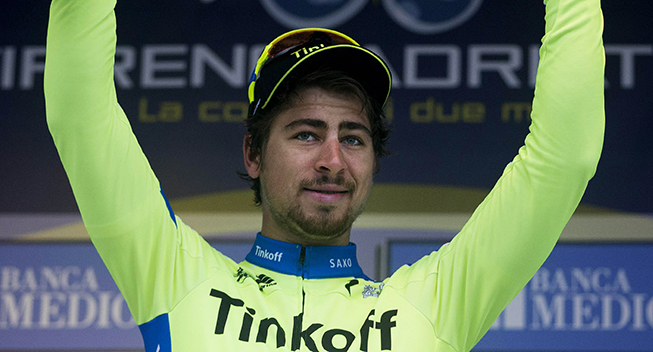Tinkoff-Saxo was more than a man down, when the front group had to decide one of the big five monuments, Milano-Sanremo, in a final sprint. Peter Sagan ultimately had to settle for a position just outside the podium after an unfortunate starting position in the sprint. However, the Slovak champion notes that he felt strong throughout the race, which was won by John Degenkolb.
Despite finishing just off the podium, Peter Sagan was in good spirits after the 293km parcours, which had started in pouring rain in Milan but ended in a true spring time setting in the costal town of Sanremo.
“It was a tough race, also due to the rain. But at least the weather was better than last year and in the final part of the race, the roads dried and the sun came out. I would like once again to thank my teammates because they worked really hard during the race. But at the end, although I was feeling very well and in form, I think I made a mistake, when I approached the final sprint too far down in the pack”, says Peter Sagan, who adds that his starting position made it difficult.
“I was too far down after the last corners, which meant that I had to overtake too many to be successful at the end. However, now I focus on the Cobbled Classics ahead and I must admit that I feel well and in good form. We will see how the next races play out”.
A select group of 26 riders reached the final sprint, where it was John Degenkolb (Giant-Alpecin), who catapulted himself out of the slipstream of Alexander Kristoff to take the win. Peter Sagan came fast from behind and finished fourth in Sanremo, while Matti Breschel was 12th.
It was no less than the 106th running of Milano-Sanremo that the riders faced at the start in Milan Sunday morning. As one of the big monuments of cycling, no quarter were given – not from the route, the weather or the rivals battling it out on the 293km route to Sanremo. Tinkoff-Saxo DS Bruno Cenghialta comments after the race that several crashes made it difficult to stick to the team strategy.
“Unfortunately the race didn’t play out as we had planned. We needed a strong rider in the last kilometers and our strategy had been to position and assist Peter Sagan during the last kilometers after the descent from Il Poggio with a few kilometers to go. But due to crashes in the peloton, we lost two riders from our tactical plan, as Maciej Bodnar and Roman Kreuziger were obstructed”, says Bruno Cenghialta.
“Matti Breschel didn’t have the final power for push towards the line. So with Roman, Maciej and Chris gone, Peter wasn’t delivered in the final sprint, which is so important because of the frantic fight for positions. Here, you can lose many positions in a split second. This is the difference between the win and a secondary placing at Milano-Sanremo, also since the final kilometers are so important”, adds Cenghialta.
Asked whether Sagan made a mistake, when he hesitated after having created a small gap with 1.5km to go, Bruno Cenghialta notes that it would have been a very difficult mission to finish had he continued.
“I don’t think it was a mistake, and he did the right thing in waiting for the sprint. He got a few meters, which he could have exploited, but at the same time the sprinters and lead-out men came fast from behind”.
Due to the wet or damp road surface, Milano-Sanremo once again saw its fair share of crashes. For Tinkoff-Saxo, strong Dane Chris Juul-Jensen had it worst and had to abandon the race just before the finale.
“Chris had done a great job up until he was brought down by a crash in front of him on a fast descent with around 40km to go. He had a blow to the head and scratches and pulled out of the race. He needed a few stitches and went to the hospital, where the initial report was that he had not suffered any serious injuries”, finishes Bruno Cenghialta.
| 25.04: Gran Premio della Liberazione |
| 25.04: Gran Premio della Liberazione |
| 23.04 - 27.04: CAC Nile Tour |
| 27.04: E3 Saxo Classic |
| 27.04: Ceratizit Festival Elsy Jacobs |
| 27.04: Liberazione Juniores |
| 27.04: Leiedal Koerse |
| 21.04 - 28.04: Presidential Cycling Tour of T... |
| 23.04 - 28.04: Tour de Romandie |
| 24.04 - 28.04: Tour of the Gila Women |
| Oliverio RINCON 56 years | today |
| Jiri SKALICKY 33 years | today |
| Rafael ESCARCEGA 35 years | today |
| David KASKO 27 years | today |
| Colm QUINN 42 years | today |
© CyclingQuotes.com









